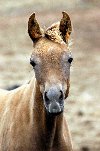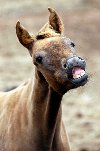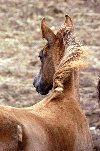History & Goals Of The Stud   
|
|
The Chalani aim has always been to produce quality athletic horses between 15.1h and 16.1h, suitable as top led-in horses and versatile enough to perform in a wide range of events. We are particularly stringent on the right temperament for novices and experienced horsemen alike to enjoy.
To this end we are great supporters of the Australian product and believe the qualities of a good Australian Stock Horse to be superior to that of imported (often more expensive) breeds, as it is proven under Australian conditions. Although only a small family stud, Chalani is recognised by results as one of the nation's leading breeders, and the stud now has broodmares that reflect fourth and fifth generation home breeding. The stud commenced in 1966 with the breeding of the polo pony mare Paradis, and the resultant foal, a filly, engendered a desire to perpetuate and preserve Australian bloodlines. This bloodline is still a part of the stud today. Following the formation of the Australian Stock Horse Society at Scone, NSW, in 1971, Peter Gower enthusiastically called a meeting in 1972 to form a South Australian Branch. At Chalani there is a great belief in the value of inbreeding, and the correct use of genetic principles. With this in mind Peter, Jeanette and Kim are continually researching pedigrees and noting the characteristics of the different bloodlines. In 1974, Peter published the Australian Stock Horse Stallion Pedigree Book (now a collectors item) for the assistance of other breeders. Incredibly with the classification system in place Australia-wide at that time, it was noted that most horses could be traced back to a select group of 14 foundation horses of mostly Thoroughbred descent. See History of The Breed. These horses were responsible in no small way for giving the Australian Stock Horse its unique characteristics and type. See: What is an Australian Stock Horse. For this reason the breeding efforts at Chalani have concentrated on the classic Hunter Valley bloodlines, preferring Thoroughbred polo blood close up for speed, athletic ability, soundness and temperament. In 1975 Rannock was purchased, a horse inbred to the mighty foundation sire Panzer and already a sire of top polo horses. Rannock had a great influence on Australian Stock Horse breeding in South Australia and put the stud on the map at a national level. Chalani rarely sells a broodmare, preferring instead to change over its stallions which we are then able to offer with utmost confidence as tried and proven sires. Broodmares must perform and then produce quality foals that are thrifty and early maturers, with a good mental attitude. The stud has been bred up from two proven all-round mares with the introduction of outcross blood, mostly Thoroughbred and heritage lines, from time to time. Unfortunately for every 4-5 mares tried, only one will advance to permanent status. As an example of the quality of our horses, were the first SA stud to have bred horses that have won at the ASH National Championships. One mare, Chalani Giselle, has produced three foals that have gone on to win or place at the ASH National Championships. Future goals include selectively breeding along heritage lines to perpetuate the true Australian horse. Ultimately we would like 95% of the horses we produce to be Heritage bred, under the rules developed by the Australian Stock Horse Society. Our tough standards of selection and our experience over the years are the reasons why we believe you can look at a Chalani horse with confidence. We have many photos and videos of our successful horses performing, relatives to view and testimonials from satisfied customers. We believe you get what you pay for, and at Chalani you get value for money. Our horses sell quickly and orders for fillies usually need to be placed in advance (see our Sales List). QUALITY IS OUR STRENGTH AND YOUR PROTECTION There is hardly anything in the world that someone cannot make a little worse and |